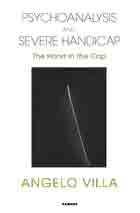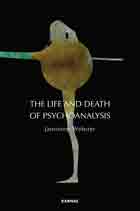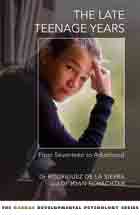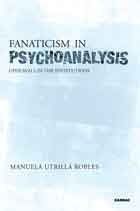Psychoanalysis and Severe Handicap: The Hand in the Cap

Book Details
- Publisher : Routledge
- Published : February 2013
- Cover : Paperback
- Pages : 196
- Category :
Psychoanalysis - Category 2 :
Lacanian Psychoanalysis - Catalogue No : 33262
- ISBN 13 : 9781780491349
- ISBN 10 : 1780491344
There are currently no reviews
Be the first to review
The book Psychoanalysis and Severe Handicap: The Hand in the Cap introduces an original look at handicap, a look aiming at capturing the subjectivity, no matter how weak or uncertain it may be, of the ill Other. In this light the work of operators can become an invaluable support to the creation of the self, a crucial help to self-narration, and a valid contribution to making one's way through the entangled intricacies of language.
The text falls into six chapters, which elegantly and accurately lead us into the core of the problem tackled. Focusing on the difficulties implied by the recognition of the ill Other and the acceptance of the otherness, Villa attacks those cultural policies which set autonomy and integration as absolute objectives to be achieved in the work on handicap. Instead, the author highlights the need of a path aiming at the structuring of the individuality of the disabled and at the molding of their subjectivity, starting from the subject's peculiarities. This is the only way for the disabled to find his place in the world to fit in.
But how could we do it? The author envisages the possibility of replacing the repetition of trite models with creative solutions and of developing new strategies for intervention on handicap, which may finally focus on transcription, that is to say the original rewording of experience, and on laughter, seen as the faithful companion of unexpected events.
This is a book that combines years of clinical practice with a solid theoretical reflection on the world of handicap. It will be a valuable support to the work of social operators but, also and above all, a reflection for everyone on the suffering of the human life.
Reviews and Endorsements
‘The unique difficulties that we encounter in the face of human handicap, allegorised in this mytho-etymological parable, will become clear to you as you read this extraordinary work by Angelo Villa, an author whose name, let I remind you, means the messenger or angel of the house. His book’s many-layered clinical examples give us insight into some of the oldest and most contested categories of psychoanalysis: from drive and desire, to subjectivity and identity, and finally, language and symbolisation. These categories, refracted through the lens of the handicapped, bring us a unique perspective on so-called “normality”, or perhaps better, simply the human condition.
Villa’s book returns to us a desire to passionately explore origins, a first sublimation of drive and sexuality in an epistemophilic love of impossibly searching for what has shaped us. At the same time — and isn’t this the negative underside of all searching? — his book drops you down to the very bottom of your being, the abyss of the unconscious, a descent that isn’t always easy to bear. Perhaps it is only the identification with Villa as the figure of the psychoanalyst par excellence that allows you to bear the tension of having to live through both movements at once. I would urge you to follow Angelo Villa here, but I’ll also warn you: hold on from the very bottom of your being. I promise you’ll be grateful to him after reading this book and, when all is said and done, you’ll understand.’
- From the Preface to the English translation by Jamieson Webster, author of The Life and Death of Psychoanalysis
‘I want three things from an essay: first, that it is relevant to my interest for psychological, or more precisely psychoanalytical issues; second, that it is absorbing; and third, that it is educational in the widest meaning of the word, that is, it provides knowledge, competence, new experiences, and previously unexplored horizons. When a book makes it, it is a proper gift and it deserves to be read enthusiastically, for books live on the communicative exchange between the writer and the reader. All of this happens from the very first pages of Angelo Villa’s extraordinary work Psychoanalysis and Severe Handicap. This book is the result of a professional adventure that coincides with the author’s life; such is the value of the elements of scientific knowledge, experience, and consideration that pervade this book.’
- From the Preface to the Italian Edition by Silvia Vegetti Finzi
The text falls into six chapters. In the first chapter the author deals with the question of the normal subject's reception of otherness as embodied by the disabled and focuses on the difficulties implied by the recognition of the ill Other and by the acceptance of otherness.
In the second chapter Villa clarifies the basis on which the difference between normality and pathology rests, emphasizing the concepts of identity and of the creation of subjectivity and attacking those cultural policies which set autonomy and integration as absolute objectives to be achieved in the work on handicap.
The third chapter follows the guidelines of the preceding one, offering a close-up on the relationship between intelligence and disability and posing questions as to the normal subject's possibility of taking up the role of interpreter of the language spoken by the handicapped.
The fourth chapter delineates the stages in the creation of the normal identity. Starting from this, Villa suggests a viable approach to severe handicap, a path aiming at the structuring of the individuality of the disabled and at the moulding of their subjectivity.
In the fifth chapter the author introduces a clinical case, thus highlighting some crucial points, both practical and theoretical, which may accompany and sustain the work of social operators. Indeed, he recommends a different subjective approach, aiming at supporting the subjectivity of the ill Other. There is a sore need to work as a team with a view to planning effective actions and strategies and to sustaining the communicative possibilities of the disabled. Villa sheds light on how the operator should relate the subject to the world, starting from the subject's peculiarities, so that the disabled too may find their place in it.
In the last chapter the author ends his text with further suggestions for work on severe handicap. He criticizes the frequent fall into chronicization and into repetitiveness within institutions, which may damage both the disabled and the operators. The author envisages the possibility of replacing the repetition of trite models with creative solutions and of developing new strategies for intervention on handicap, which may finally focus on transcription, that is to say the original rewording of experience, and on laughter, seen as the faithful companion of unexpected events.
About the Author(s)
Angelo Villa, PhD, is a psychoanalyst and a member of both the Lacanian School of Psychoanalysis and the European School of Psychoanalysis. He works as a clinician in a public hospital and he is a supervisor in different social projects. Villa is a co-professor of Rehabilitation Psychology at University Bicocca of Milan and a full (tenured) professor at Clinic Section of Milan and at the Freudian Institute for clinic, therapy and science in Rome. His principal interests concern handicap and autism, psychic malaise and clinical practice, working with underage and deviance matters. Angelo Villa is also an author of a wide and varied literary production concerning psychopathology and techniques for clinical interventions, psychoanalysis and clinical psychology, child psychology, and applied psychoanalysis.
Customer Reviews
Our customers have not yet reviewed this title. Be the first add your own review for this title.







